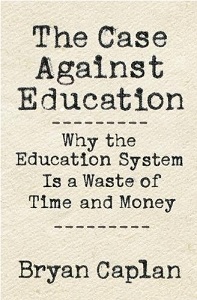[ad_1]
I talked about training and constructive externalities in a latest submit. In that submit, I took as a right that training has constructive externalities, and that subsidizing training is an applicable position of presidency, based on commonplace financial concept. Nonetheless, as is usually the case, there’s extra to the story. Issues which have constructive externalities can concurrently have adverse externalities as properly. It’s not a foregone conclusion what the online impact can be, even within the case of training.
Nonetheless, there’s additionally a delicate fallacy of equivocation we should always keep away from falling into. The fallacy of equivocation occurs once we use the identical phrase, however that phrase refers to various things at totally different phases within the argument. For this dialogue, it’s essential to differentiate between training, by which I imply the overall strategy of gaining data and expertise, and the training system, by which I imply the system of colleges, accreditation, levels, and so forth.
The training system is also known as simply training, however they’re not the identical factor. For instance, Bryan Caplan’s e book on the subject would in all probability have a extra correct (if much less provocative) title if it had been known as The Case In opposition to the Training System, somewhat than The Case In opposition to Training.

Training has constructive externalities – my neighbors being sensible and well-informed advantages me as properly along with the advantages it supplies them. However the truth that training has constructive externalities doesn’t entail that the present training system should be backed. These are various things, and arguments about one can’t merely be copy-pasted onto one other.
A adverse externality that exists with the training system comes from the thought of what economists name positional items. A positional good is when somethings worth so that you can possess is dependent upon the truth that it’s not possessed by others. As that good turns into extra broadly possessed, it turns into much less priceless to you. For instance, a sandwich is clearly not a positional good – the worth of your lunch doesn’t go down simply because different folks even have a sandwich to eat at lunchtime. However the training system produces positional items – the worth of the diploma you achieve turns into decrease as extra folks additionally purchase the identical diploma.
What number of occasions have you ever heard some variation of this lament?
It’s getting more durable and more durable for folks to maintain up as of late. Not too way back, it was potential for somebody to go straight out of highschool right into a profession that may allow them to purchase a home and help a household, and graduating school was a surefire ticket to the higher class. However now, you want a university diploma simply to have an opportunity to be center class, and individuals who by no means graduate school have virtually no hope in any respect of constructing an honest middle-class life.
A part of that is because of the positional items nature of levels. Charges of each school and highschool commencement only some many years in the past was a lot decrease than at present – and due to that, having a highschool diploma or a university diploma was value a lot, far more. Typically folks recommend that the obvious necessity of getting a university diploma to safe a superb job means we should always extra closely subsidize the training system so extra folks can get school levels, however it is a self-defeating method. If by waving a magic wand we might make bachelor’s levels as widespread amongst folks now as highschool levels at the moment are, the consequence wouldn’t be to safe the monetary way forward for everybody who magically gained a brand new bachelor’s diploma. It will be to mainly wipe out the market worth of everybody’s bachelor’s diploma, and going ahead it could take a grasp’s or PhD simply to get the identical profit on the job market as is at the moment gained by an undergraduate diploma.
It’s essential to not confuse the sign with the underlying actuality the sign is supposed to replicate – and to acknowledge you may’t change the underlying actuality by merely altering the sign. To start with of the Nice Despair, after worldwide tariffs had been employed, meals costs in America collapsed as export markets had been restricted. A program was put into place forestall new meals from being grown, or destroy at the moment present meals, to attempt to drive the worth again up once more. The pondering appeared to be “When the financial system was sturdy meals costs had been excessive, so if we are able to make meals costs excessive then the financial system can be sturdy once more.” However that method obtained issues all improper – it mistook the sign for the truth.
In the identical approach, many individuals have argued that since folks with school levels make more cash than folks with out school levels, if we are able to simply make it so extra folks have a university diploma by subsidizing the training system, then everybody will make more cash. However that, too, is improper. It’s additionally mistaking a sign for the truth – and it overlooks the positional items facet of the training system. Growing the variety of school graduates doesn’t essentially give the present advantages of school to an increasing number of folks. It could as a substitute solely dilute the worth of a school diploma to those that have it, and additional block the upward mobility of those that lack a level.
[ad_2]
Source link





